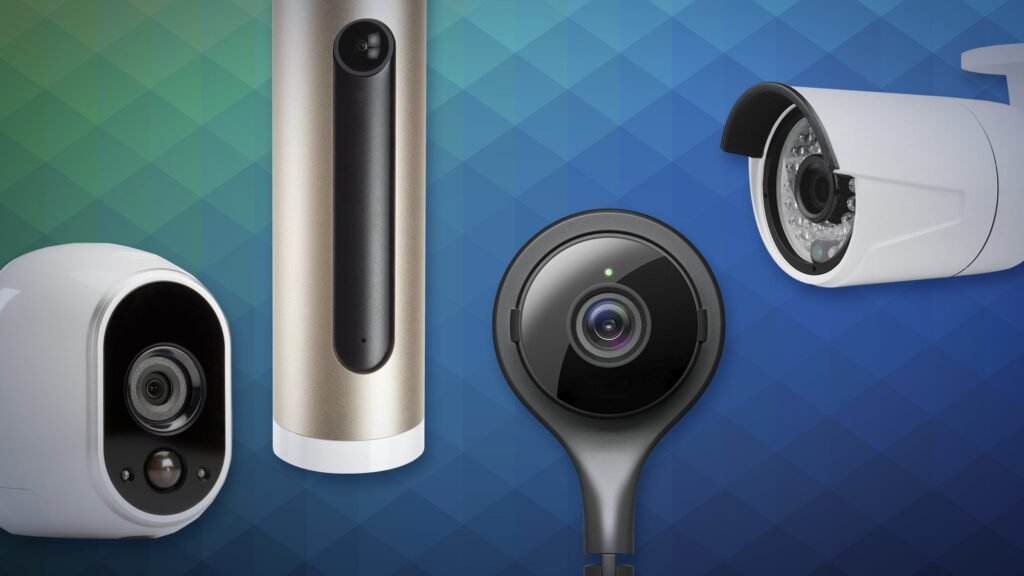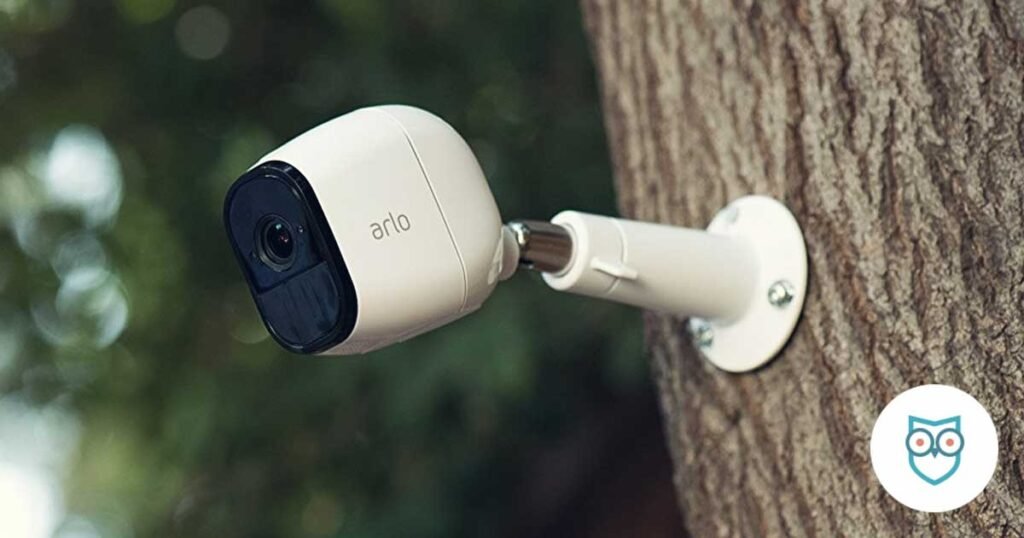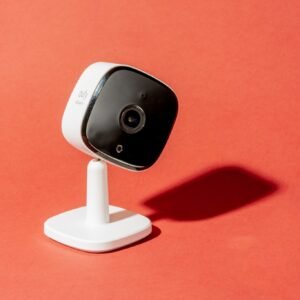So you’re looking for the best types of security cameras to keep an eye on your home, huh? Well, you’ve come to the right place! In this article, we will explore the different options available to you and help you make an informed decision. Whether you want to keep an eye on your front door or monitor your entire property, we’ve got you covered.
Curious to know which security cameras will offer you the best features and the highest level of protection? Look no further! In this article, we will dive deep into the world of security cameras and discuss the various types that are available on the market today. From outdoor cameras with night vision capabilities to indoor cameras with two-way audio, we’ll explain how each type works and help you determine which ones will best suit your needs. So if you’re ready to learn more about the best types of security cameras for monitoring your home, let’s get started!

This image is property of www.techhive.com.
Overview of Home Security Cameras
When it comes to the safety and security of your home, having a reliable surveillance system is crucial. Installing security cameras not only adds an extra layer of protection but also provides you with peace of mind knowing that you can monitor your property at all times. However, with so many different types of security cameras available in the market, it can be overwhelming to choose the best one for your specific needs. In this article, we will discuss the importance of home security cameras, factors to consider when choosing them, and different types of security cameras to help you make an informed decision.
Importance of Home Security Cameras
Deterrence and Prevention
One of the primary benefits of having security cameras in your home is their deterrent effect. Visible security cameras act as a warning to potential intruders, making them think twice before targeting your property. The mere presence of security cameras can often be enough to deter criminals, protecting your home and loved ones from potential threats.
Evidence Gathering
In the unfortunate event of a break-in or any other criminal activity, security cameras can act as valuable evidence. The footage recorded by these cameras can be used by law enforcement authorities to identify the culprits and provide a clear account of the events. This evidence can greatly increase the chances of apprehending the criminals and recovering any stolen belongings.
Remote Monitoring and Peace of Mind
Another significant advantage of modern security cameras is the ability to monitor your home remotely. With the help of an internet connection, you can access live or recorded footage from your security cameras using your smartphone, tablet, or computer. This remote monitoring feature allows you to keep an eye on your home from anywhere in the world, providing you with peace of mind even when you’re away.

This image is property of pyxis.nymag.com.
Factors to Consider when Choosing Security Cameras
Indoor vs. Outdoor Cameras
Before selecting security cameras, it’s important to determine whether you need indoor or outdoor cameras. Indoor cameras are designed to monitor the inside of your home and are typically smaller and less weather-resistant. On the other hand, outdoor cameras are built to withstand harsh weather conditions and are equipped with features like weatherproof housings and infrared illuminators for night vision.
Resolution and Image Quality
The image quality of security cameras is an essential factor to consider. Higher resolution cameras provide clearer and more detailed video footage. The two most common resolutions for security cameras are High Definition (HD) and Ultra High Definition (UHD) or 4K. While HD cameras offer good image quality, UHD cameras provide even sharper and more detailed images, allowing you to easily identify faces, license plates, and other important details.
Field of View and Coverage
The field of view (FOV) refers to the area that a security camera can capture. It’s important to choose cameras with an adequate FOV that covers the desired areas for surveillance. Wide-angle lenses are commonly used in security cameras to provide a broader view. Additionally, consider cameras with pan, tilt, and zoom (PTZ) functionality to adjust and cover specific areas as needed.
Wired vs. Wireless Cameras
Security cameras can be wired or wireless, and each has its own set of advantages and disadvantages. Wired cameras require a physical connection to a power source and a video recorder, which provides a stable and reliable connection. Wireless cameras, on the other hand, are easier to install as they don’t require cables for power or video transmission. However, they rely on a Wi-Fi signal that can be affected by distance, interference, or signal loss.
Night Vision Capabilities
If you want round-the-clock surveillance, consider security cameras with night vision capabilities. Infrared (IR) illuminators are integrated into cameras to provide visibility in low-light or no-light conditions. The range of night vision can vary, so choose cameras that offer sufficient coverage for your needs.
Audio Recording
Some security cameras come with built-in microphones or audio recording capabilities. This allows you to not only monitor video footage but also capture audio recordings of the surrounding environment. This can be particularly useful in situations where audio evidence is required.
Weather Resistance
For outdoor security cameras, it’s important to choose models that are designed to withstand different weather conditions. Look for cameras with weather-resistant housing or an IP (Ingress Protection) rating to ensure protection against dust, water, and extreme temperatures. This will help prolong the lifespan of your cameras and ensure their reliability in challenging weather conditions.
Installation and Maintenance
Consider the ease of installation and maintenance when choosing security cameras. Some cameras require professional installation, while others are designed for do-it-yourself (DIY) setup. Additionally, think about the level of maintenance required, such as cleaning the lenses or replacing batteries if you opt for wireless cameras.

This image is property of www.safewise.com.
Different Types of Security Cameras
Now that we have discussed the factors to consider, let’s explore the different types of security cameras available in the market.
Bullet Cameras
Bullet cameras are a popular choice for outdoor surveillance due to their long-range capabilities and visible deterrent effect. These cameras are shaped like a bullet or cylinder and are often mounted on walls or ceilings. They are equipped with a fixed lens and are generally easy to install.
Dome Cameras
Dome cameras are named after their dome-shaped housing. They are commonly used for both indoor and outdoor surveillance. Dome cameras provide a 360-degree coverage due to their wide-angle lenses, and their design makes it difficult for potential intruders to determine the direction of the camera. Dome cameras can be further classified into vandal-resistant models that are built to withstand tampering or harsh conditions.
PTZ Cameras
Pan, tilt, and zoom (PTZ) cameras offer great flexibility in monitoring specific areas. These cameras can be remotely controlled to pan horizontally, tilt vertically, and zoom in and out. PTZ cameras are popular for large properties or areas that require constant monitoring. They often come with auto-tracking features, enabling them to follow the movement of a person or object, as well as scheduled patrols to monitor different areas automatically.
Wireless Cameras
Wireless cameras are the go-to option for those who want easy and flexible installation. These cameras connect to your Wi-Fi network and can be placed in various locations without the need for cables. They offer remote access and control through mobile apps or web interfaces, allowing you to monitor your home from anywhere with an internet connection. Wireless cameras are also expandable, allowing you to add more cameras as needed. However, keep in mind that wireless cameras may be susceptible to signal interference or signal loss due to distance or obstructions.
Outdoor Cameras
Outdoor cameras are designed specifically for the challenging outdoor environment. They are built with weather-resistant features, including protective housings to shield them from rain, snow, dust, and extreme temperatures. Many outdoor cameras also come with infrared illuminators for night vision and wider-angle lenses to cover larger areas.
Indoor Cameras
Indoor cameras are tailored for monitoring the inside of your home. They are usually smaller and more discreet, blending in with the decor of your house. Indoor cameras offer features like two-way audio communication, allowing you to hear and speak through the camera, making them useful for checking on pets or communicating with family members.

This image is property of cdn.thewirecutter.com.
Conclusion
In conclusion, choosing the right security cameras for your home requires careful consideration of various factors. By assessing your specific needs and requirements, such as indoor or outdoor surveillance, resolution, field of view, wired or wireless connection, night vision capabilities, audio recording, weather resistance, and ease of installation, you can make an informed decision. It’s always advisable to consult with professionals who can provide expert advice and guidance based on your specific circumstances. Remember to ensure proper installation and placement of the cameras to maximize their effectiveness in monitoring and protecting your home. With the right security camera system in place, you can have peace of mind knowing that your home is well-protected.

This image is property of cdn.thewirecutter.com.
